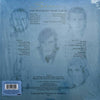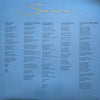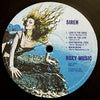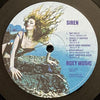











Roxy Music – Siren (Half-speed Mastering)
[click here to see more vinyl by Roxy Music]
Bryan Ferry – vocals, keyboards, harmonica
John Gustafson – bass
Eddie Jobson – strings, synthesizer, keyboards (credited as 'Edwin Jobson')
Andy Mackay – oboe, saxophone (credited as 'Andrew Mackay')
Phil Manzanera – guitar
Paul Thompson – drums
Written by Bryan Ferry (all tracks), Phil Manzanera (A4, B4), Andy Mackay (A1, A3), Eddie Johson (B1)
1 LP, standard sleeve
Original analog Master tape : YES
Half-speed Mastering
Heavy Press : 180g
Record color : black
Speed : 33 RPM
Size : 12'’
Stereo
Studio
Record Press : Optimal Media GmbH
Label : Republic Records
Original Label : Islands Records
Recorded June 1975 – September 1975 at Air Studios, London
Engineered by Steve Nye
Produced by Chris Thomas
Remastered at Abbey Road Studios
Lacquer cut by Miles Showell at Abbey Road Studios
Originally released in October 1975
Reissued in June 2022
Tracks:
Side A:
- Love Is the Drug
- End of the Line
- Sentimental Fool
- Whirlwind
Side B:
- She Sells
- Could It Happen to Me?
- Both Ends Burning
- Nightingale
- Just Another High
Reviews :
“Abandoning the intoxicating blend of art rock and glam-pop that distinguished Stranded and Country Life, Roxy Music concentrate on Bryan Ferry's suave, charming crooner persona for the elegantly modern Siren. As the disco-fied opener "Love Is the Drug" makes clear, Roxy embrace dance and unabashed pop on Siren, weaving them into their sleek, arty sound. It does come at the expense of their artier inclinations, which is part of what distinguished Roxy, but the end result is captivating. Lacking the consistently amazing songs of its predecessor, Siren has a thematic consistency that works in its favor, and helps elevate its best songs -- "Sentimental Fool," "Both Ends Burning," "Just Another High" -- as well as the album itself into the realm of classics.” AllMusic Review by Stephen Thomas Erlewine
Half-speed mastering. In half-speed mastering, the whole process is slowed down to half of the original speed. A typical 33 1/3 rpm record is cut at 16 2/3 rpm. The source material is also slowed down (reducing the pitch in the process) meaning the final record will still sound normal when played back. Slowing the whole process down allows more time, which means the end result sounds better and is more efficient — allowing engineering to minimize the effects of inherent limitations within the vinyl format. The result is a more accurate and more open high-frequency response in the half speed vinyl when compared with a normal speed recording.
Ratings :
AllMusic : 5 / 5 , Discogs : 4.09 / 5


